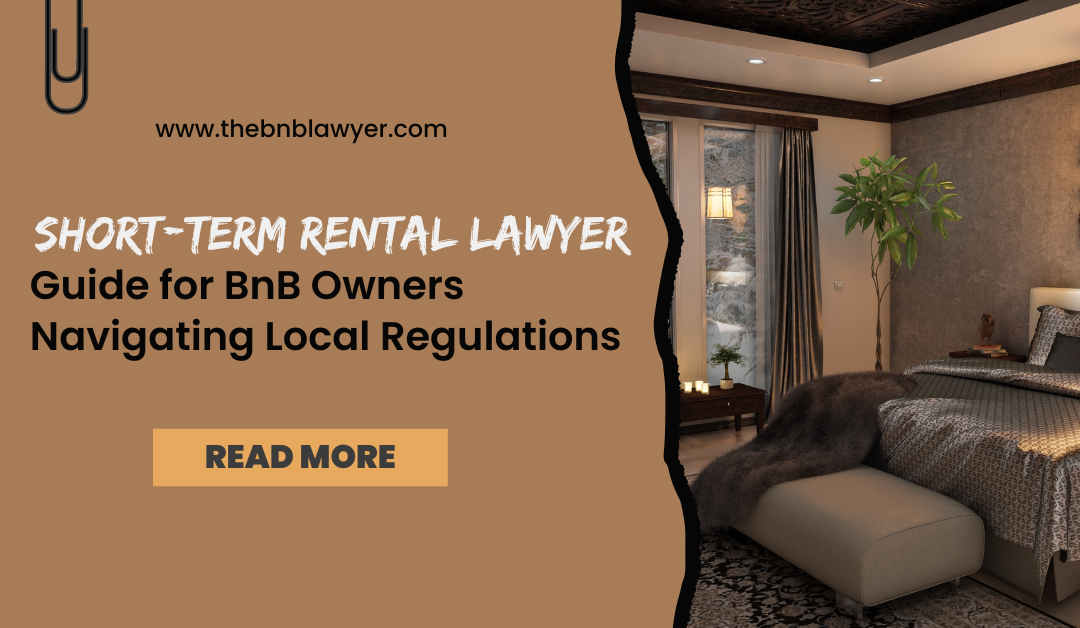The allure of hosting guests in your own cozy BnB is undeniable. However, becoming a BnB owner isn’t all about hospitality and comfort. It’s also about understanding and complying with a complex web of local regulations. Therefore, in this comprehensive guide, we’ll explore the intricacies of navigating these regulations with the expert guidance of a short term rental lawyer.
Understanding the Legal Landscape
Short-term rentals have experienced a meteoric rise in popularity, driven in large part by platforms like Airbnb and VRBO. While these platforms offer fantastic opportunities for property owners, they have also drawn the attention of local governments and regulatory bodies. As a result, numerous cities and regions have implemented regulations to govern the short-term rental industry.
Before diving into the specifics, it’s crucial to recognize that these regulations can vary widely from one location to another. This is where the expertise of a short term rental lawyer becomes invaluable. They are well-versed in the nuances of different jurisdictions and can help BnB owners stay compliant with local laws.
The Role of a Short Term Rental Lawyer
A short term rental lawyer is a legal expert who specializes in the hospitality industry, specifically in short-term vacation rentals. Their role is multifaceted:
- Legal Compliance: The primary function of a short term rental lawyer is to ensure that your BnB business complies with all relevant local laws and regulations. This includes zoning laws, permitting requirements, and tax obligations.
- Contract Review: Your lawyer can assist in reviewing and drafting contracts, including guest agreements and vendor contracts, to ensure they are legally sound and protect your interests.
- Liability Management: They help you put systems in place to manage liability effectively. This might include advising on insurance coverage and risk mitigation strategies.
- Dispute Resolution: If a dispute arises with a guest or another party, your lawyer can facilitate negotiations or, if necessary, represent you in legal proceedings.
Navigating Zoning Laws, Taxation, and Liability in Your BnB Business with Legal Expertise
Zoning and Permitting
One of the most critical aspects of BnB ownership is understanding and adhering to local zoning laws. Zoning laws dictate what properties can be used for short-term rentals and in which areas. Some areas may have specific zoning regulations that permit short-term rentals, while others may prohibit them entirely.
A short term rental lawyer will research and interpret your local zoning laws to determine whether your property is eligible for short-term rentals. If your property isn’t compliant, they can provide guidance on seeking the necessary permits or variances.
Tax Obligations
Taxation is another intricate area where an experienced short term rental lawyer’s expertise shines. Different jurisdictions have varying tax requirements for BnB owners. These may include occupancy taxes, sales taxes, and income taxes.
Your lawyer can advise you on the taxes you must collect from guests and how to remit them to the appropriate authorities. Failing to meet your tax obligations can lead to significant legal and financial consequences, so having a professional in your corner is crucial.
Guest Agreements and House Rules
Crafting legally sound guest agreements and house rules is essential for every BnB owner. These documents outline the expectations and responsibilities of both hosts and guests, helping to prevent misunderstandings and disputes.
A short term rental lawyer can review your guest agreements and house rules to ensure they are comprehensive and enforceable under local laws. They can also provide guidance on how to handle specific scenarios, such as cancellations or damage to your property.
Liability Management
Running a BnB comes with inherent risks, including the potential for guest injuries or property damage. An experienced short-term rental lawyer can help you develop risk mitigation strategies and ensure you have the right insurance coverage.
They can also advise you on safety protocols and best practices to minimize the likelihood of accidents or incidents on your property. Being proactive in this area protects your guests and shields you from potential legal liabilities.
Evolving Regulations
The regulatory landscape for short-term rentals is continually evolving. New laws and ordinances are often introduced, requiring BnB owners to adapt. A short term rental lawyer stays up-to-date with these changes, ensuring that your business remains in compliance.
The Bottom Line
Generally, navigating local regulations as a BnB owner can be a daunting task. However, with the guidance of an experienced short term rental lawyer, you can confidently operate your business within the bounds of the law. From zoning and permitting to tax obligations and guest agreements, their expertise ensures you’re well-prepared to thrive in the short-term rental industry.
So, whether you’re considering starting a BnB or already a seasoned host, partnering with a short term rental lawyer is a wise investment in your business’s success and legal compliance.
Therefore, don’t let legal complexities hinder your hospitality dreams. Contact an experienced short term rental lawyer today and embark on your BnB journey with confidence.

